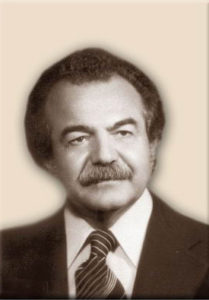
Born into a devout Jewish family in 1918, Shaban Shahri’s life was a mixture of duty, art, and faith. From his humble beginnings in Babol to becoming a beloved poet, actor, and community philanthropist in Tehran, Shaban’s journey reflects his devotion and commitment to the human community.
Early Life and Responsibilities
Shaban, also known as Shlomo, was born into a devout Jewish family in 1918 who lived in Babol, a lush and beautiful city in Mazandaran province. When Shaban was only twelve years old, his father, Yosef Shahri, passed away at the age of forty due to illness. As the eldest son, Shaban took on the responsibility of caring for his family, including his mother, brother, and two sisters.
Shaban completed his elementary and the first cycle of secondary education in Babol. After his father’s death, he worked during the day to support his family and studied at night. After completing his military service in the Iranian Air Force, Shaban used his savings to open a laundry shop in Sari. In 1946, he married Khanum Agha from the Cohen family, and they had four sons and one daughter.
A New Life in Tehran
In 1959, Shaban moved with his family to Tehran, where he started a new chapter in his life. He initially worked in the buying and selling of pharmaceuticals. In 1964, he rented a restaurant called “Shookh” on Lalehzar Street, in the Milli Alley.
As his circumstances improved, Shaban dedicated more of his time to social and cultural activities within the Jewish community. He was known for his humility and played an active role in charitable work, joining the Magbit Committee. Alongside other philanthropic members of the community, Shaban was involved in various charitable activities and often personally visited organizations to help address the needs of his fellow community members and the elderly.
Poetry and Spiritual Pursuits
Drawn to poetry
Shaban’s talent for poetry emerged during his mid-adolescence when he composed several verses. Encouraged by the attention his poetry received, he decided to devote more of his free time to studying the works of renowned Iranian poets, particularly focusing on spiritual poetry. He became especially drawn to Rumi’s “Masnavi” and later centered his studies on mystical poetry, holding poets like Rumi, Hafez, and Khayyam in high regard. His poetry reflected the influence of these great poets.
The turn to spirituality
In late 1967, due to illness, Shaban traveled to Israel for treatment. His recovery took time, and during his stay, he established connections with artists and helped found an Iranian cultural and artistic association. He also performed in several plays, including roles such as Esther-Mordechai and Sheikh Sanan, which were awarded and well-received by audiences and critics. During this period, he also learned Hebrew and studied Kabbalah.
Return to Iran
Translation of spiritual values
After three years, Shaban returned to Iran. With his knowledge of Hebrew, Kabbalah, and his faith, he sought to translate the spiritual values of Judaism laid in the Torah, into Farsi. He began translating parts of the Holy Scriptures, such as Adon Olam, Enshe, and Yigdal Elohim Chai, into clear and articulate poetic supplications. These translations were well received by the Jewish community, and Shaban continued translating and composing prayers in a similar style.
The first cassette recording of Jewish prayers
In the mid-1970s, Shaban recorded two important prayers, Patach Eliyahu and Tefilat Chana, for the first time on cassette tapes with the melodious voice of Yaghoub Banafsheh, the prayer leader at the Darvazeh Dowlat Synagogue. He donated all proceeds from the sale of these tapes to a retirement home. The Jewish Committee continued reproducing these tapes for many years.
Contributions to cinema
Shaban’s restaurant, Shookh, became a popular gathering place for friends, artists, and intellectuals. It was a venue for poetry nights, meetings with prominent figures, and discussions about charitable work. Artists and filmmakers often spent time at the restaurant.
At the suggestion of his artist friends, Shaban entered the Iranian film industry, acting in thirty feature films between 1971 and 1980, where he consistently played positive roles. In 1978, at the onset of the Islamic Revolution, Shookh restaurant was set on fire by revolutionaries, forcing Shaban to change his profession. He then began dealing in electrical goods but continued his social and cultural activities with even greater dedication.
Publishing Works
In the late 1980s, Shaban’s friends encouraged him to publish his works. He devoted more time to finalizing, reviewing, and editing his poetry. He had earlier discussed with Amnon Netzer to undertake the final editing of his work.
Over the years, Shaban’s poetry collection grew significantly larger. He organized his poems based on their style into separate volumes. Some were dedicated to Jewish holidays, such as Rosh Hashanah, Passover, Shavuot, and Purim, while others were based on historical and religious events, including Tehillim, Neilat Chana, and Akedat Yitzchak, and finally a group were categorized based on being supplications from the Torah, such as Anshei Emuna, Ana b’Koach, Adon Olam. He also compiled his shorter poems, such as couplets and quatrains, into separate volumes.
Beliefs and Legacy
Shaban Shahri believed that life was built on three principles: knowledge of the Torah, faith in the Almighty, and the practice of good deeds, including goodness and kindness with fellow human beings. Inspired by these principles, he composed the following poem:
|
Persian |
English Translation |
|
شب و روز خیرخواه و درویش باش |
Be kind and humble day and night, |
|
نه در فکر آسایش خویش باش |
rather than being busy with your own comfort. |
|
چو خواهی به کامت بگردد سپهر |
If you wish the heavens to favor you, |
|
نگهدار بیمار دل ریش باش |
care for the broken-hearted. |
|
همیشه بکامت نگردد سپهر |
The heavens won’t always favor you, |
|
بفکر ره آخرت خویش باش |
consider the path you’ll take in the afterlife. |
|
نگهدار طفلان درمانده شو |
Care for the helpless children, |
|
بشو نوش، نی در پی نیش باش |
be sweet, not bitter. |
|
چو امروز بازوی خدمت توست |
As long as you have the strength to serve, |
|
به نیکو عمل از همه پیش باش |
lead in good deeds. |
|
بفردا میفکن تو امروز کار |
Do not delay today’s work until tomorrow, |
|
نه در فکر کم نی پی بیش باش |
do not be concerned with having less or more. |
|
چو (شهری) تن و جان به خدمت سپار |
Like Shahri, dedicate your body and soul to service, |
| به فرمان حق باش و درویش باش |
obey God’s command and be humble. |
Final Years and Posthumous Recognition
In the winter of 1991, Shaban Shahri suffered a heart attack and passed away at the age of 72, before he could see his life’s work published. After his death, his children, determined to fulfill his wishes, collected and organized his works, publishing them in several volumes under the title “Couplets and Supplications of Shahri”. Below is an example of one of Shaban Shahri’s couplets:
|
Persian |
English Translation |
|
درویش |
Humble |
|
زندگانی یک سرابی بیش نیست |
Life is nothing more than a mirage, |
|
هیچ مقامی برتر از درویش نیست |
no status is higher than that of a humble person. |
|
خدمت مردم کن و یزدان پرست |
Serve the people and worship God, |
|
بت پرستی شیوه درویش نیست |
idol worship is not the way of the humble. |
A scene from the film “Ayene-ye zaman” (Mirror of Time) in which Shaban Shahri played a role.
Timeline
| Year |
Event |
| 1918 |
Born in Babol. |
| 1930 |
Lost father at 12; As the eldest child, assumed responsibility for family. |
| 1940s |
Completes military and opens a laundry shop in Sari. |
| 1946 |
Marries Khanum Agha from the Cohen family. |
| 1959 |
Moves to Tehran; Begins working in pharmaceuticals; Rents “Shookh” restaurant. |
| 1967 |
Travels to Israel for medical treatment; Deepens his engagement with poetry, spirituality, and the arts. |
| 1970s |
Returns to Iran, translates spiritual Jewish texts into Farsi; records Jewish prayers on cassette tapes for charity. |
| 1971-1980 |
Acts in thirty feature films in the Iranian film industry. |
| 1978 |
His restaurant is set on fire; Begins dealing in electronics. |
| 1991 |
Suffers a heart attack and dies at the age of 72; His children publish his works. |




 فارسی
فارسی